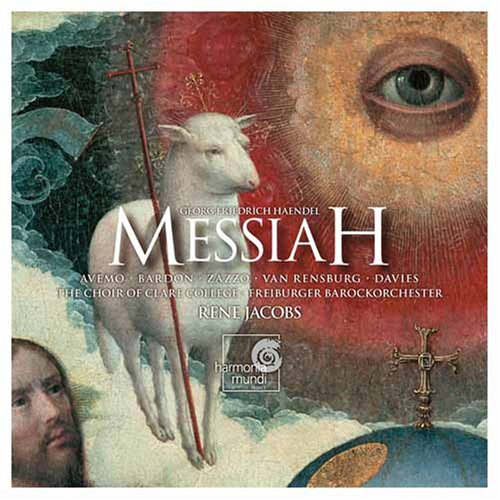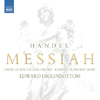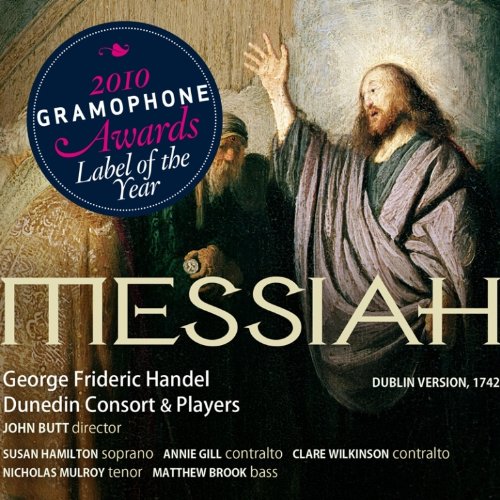Handel Messiah
Outstanding choirs but it's back to the start for a really fresh, joyful Messiah
View record and artist detailsRecord and Artist Details
Composer or Director: George Frideric Handel
Genre:
Vocal
Label: Harmonia Mundi
Magazine Review Date: 12/2006
Media Format: CD or Download
Media Runtime: 138
Mastering:
Stereo
DDD
Catalogue Number: HMC90 1928/9

Tracks:
| Composition | Artist Credit |
|---|---|
| Messiah |
George Frideric Handel, Composer
Clare College Choir, Cambridge Freiburg Baroque Orchestra George Frideric Handel, Composer Kerstin Avemo, Soprano Kobie van Rensburg, Tenor Lawrence Zazzo, Alto Neal Davies, Bass Patricia Bardon, Mezzo soprano René Jacobs, Conductor |
Composer or Director: George Frideric Handel
Genre:
Vocal
Label: Naxos
Magazine Review Date: 12/2006
Media Format: CD or Download
Media Runtime: 142
Mastering:
Stereo
DDD
Catalogue Number: 8 570131/2

Tracks:
| Composition | Artist Credit |
|---|---|
| Messiah |
George Frideric Handel, Composer
Academy of Ancient Music Eamonn Dougan, Bass Edward Higginbottom, Conductor George Frideric Handel, Composer Henry Jenkinson, Treble/boy soprano Iestyn Davies, Countertenor New College Choir, Oxford Otta Jones, Treble/boy soprano Robert Brooks, Treble/boy soprano Toby Spence, Tenor |
Composer or Director: George Frideric Handel
Genre:
Vocal
Label: Linn
Magazine Review Date: 12/2006
Media Format: Super Audio CD
Media Runtime: 0
Mastering:
Stereo
DDD
Catalogue Number: CKD285

Tracks:
| Composition | Artist Credit |
|---|---|
| Messiah |
George Frideric Handel, Composer
Clare Wilkinson, Contralto (Female alto) Dunedin Consort George Frideric Handel, Composer John Butt, Conductor Matthew Brook, Baritone Nicholas Mulroy, Tenor Susan Hamilton, Soprano |
Author: David Vickers
Some familiar music bears ripe fruit when taken a shade slower than has become common in recent times (“Glory to God” is splendid rather than hurried, and all the better for it). Ex-scholar Toby Spence is on fine form in “Rejoice greatly”, and Iestyn Davies's poetic singing is another enjoyable feature, although I hankered for a more dramatic treatment of “shame and spitting” (“He was despised”). “The trumpet shall sound” resounds with David Blackadder's magnificent playing, and the Academy of Ancient Music play Handel's orchestral parts immaculately, often seeming gentler in quicker music here than on Christopher Hogwood's 1980 recording. This Naxos release will appeal to those who want an affordable Messiah that is beautifully played, brightly sung, sweetly satisfying and unashamedly English in its sentimental roots.
René Jacobs produces a less subtle and riskier performance. Kobie van Rensburg's authoritative accompanied recitatives and Lawrence Zazzo's “But who may abide” are impressively dramatic, and Neal Davies's singing is typically vigorous. The outstanding Choir of Clare College, Cambridge, defy any argument that there is a bland uniform tradition of so-called Oxbridge choral singing. Cambridge's young adults provide an entirely different choral texture and approach to the boys and scholars of their Oxford counterparts under Higginbottom.
“Behold the Lamb of God” is richly expressive yet clear and sweetly balanced, although the over-aspirated detachment of certain key phrases in “All we like sheep” is misconceived (interpreters who use smoother lines which get lost in fading away understand the meaning of the text). Jacobs juxtaposes brilliance with foolishness. For “All they that see him” he decides to take things as fast as possible, but the subsequent related chorus “He trusted in God” is incongruously taken at a perfectly conventional steady pace. The use of harp for the angel's recitative gets on my nerves (it is more like Tom and Jerry's idea of an angelic messenger than Jennens's), as does Jacobs's needless alterations to Handel's sustained string parts in “He was despised”. Some might like the waywardness of iconoclastic challenges but, in truth, a lot of the new ideas here are poorly conceived and show a poor grasp of Handel's musical personality.
For an infinitely more rewarding fresh look at Handel's most familiar music, look no further than the Dunedin Consort's performance of Handel's first version, premiered at Dublin in 1742. Bizarrely under-represented in concert and on disc, the Dublin score contains some fascinating music that Handel never reused, such as the substantial chorus “Break forth into joy”. The exuberant direction by harpsichordist John Butt is meticulously stylish and utterly devoid of crassly pretentious egotism. The playing is unerringly spontaneous and dramatically integrated with singers who illustrate profound appreciation of text. Clare Wilkinson's “He was despised” is most moving, Susan Hamilton effortlessly skips through a delicious “Rejoice greatly”, and bass Matthew Brook sings as if his life depends on it.
Butt bravely resolves to use the same forces Handel had at his disposal in Dublin, which means that the entire oratorio is sung by a dozen singers (with all soloists required to participate in the choruses, as Handel would have expected). Where this approach might risk worthy dull solos churned out by stalwart choir members, the Dunedin Consort's exemplary singers produce virtuoso choruses that are theatrically charged, splendidly poised and exquisitely blended. Old warhorses “For unto us a child is born” and “Surely he hath borne our griefs” are delightfully inspiring. Butt and the Dunedin Consort marry astute scholarship to sincere artistic expression and the result is comfortably the freshest, most natural, revelatory and transparently joyful Messiah I have heard for a very long time.
Explore the world’s largest classical music catalogue on Apple Music Classical.
Included with an Apple Music subscription. Download now.

Gramophone Digital Club
- Digital Edition
- Digital Archive
- Reviews Database
- Full website access
From £8.75 / month
Subscribe
Gramophone Full Club
- Print Edition
- Digital Edition
- Digital Archive
- Reviews Database
- Full website access
From £11.00 / month
Subscribe
If you are a library, university or other organisation that would be interested in an institutional subscription to Gramophone please click here for further information.




